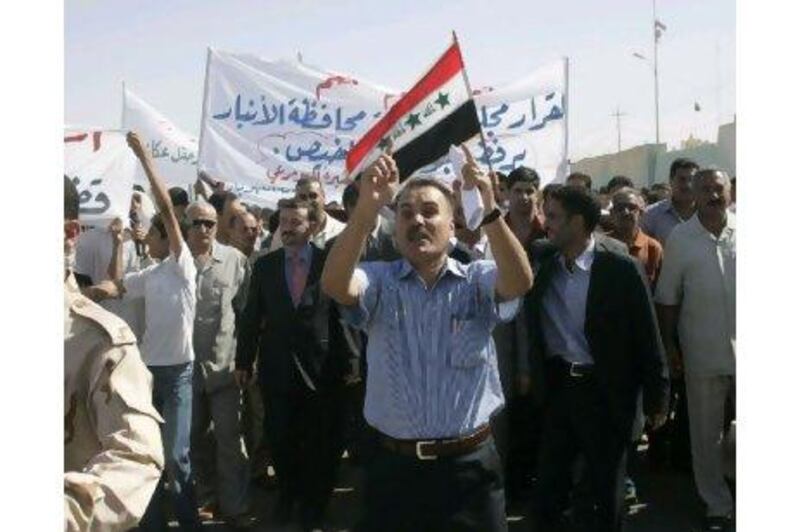Iraq's oil ministry has signed off on two of the three contracts it awarded to the winners of last month's auction of gas licences. This is progress for the country, but also highlights uncertainties about Iraq's future.
The unsigned contract is the one to develop the Akkas gasfield, the largest of three fields offered in the ministry's October 20 bidding round. It is in Iraq's western province of Anbar, in a desert region close to the Syrian border. The province, dominated by Sunni Arab tribes, has recently been at the centre of protests against Baghdad's energy policies.
Those culminated last month in a series of protests that some have called the "Anbar revolt". The oil ministry's failure to sign the Akkas deal with the other two could therefore signal further trouble ahead.
"The delay in the signing of a preliminary Akkas gasfield contract signals that all is not well with the latest auction round results," Samuel Ciszuk, the senior Middle East energy analyst at IHS Global Insight, wrote in a research note on Tuesday. "Although oil companies in the past nine months have managed to turn the lack of oil-sector politicisation to their advantage, obstacles needing government intervention are now mounting up."
A surprising observation in the report was that the delay in forming a new government after Iraq's national election in March had "proved quite beneficial" for foreign companies starting up oil and gas projects.
"The focus on government formation and power-sharing deals between the political blocs and factions has meant that companies have been left to their own devices in carrying out technical surveys and planning initial deployments and developments, with very little politicisation," said Mr Ciszuk. "Iraq's oil ministry has also been able to function continuously along technocratic lines, encouraging a burgeoning co-operative spirit between the international oil companies and the higher levels of its production subsidiaries, particularly the South Oil Company."
That company is the largest of Iraq's state-owned oil and gas producers, holding 25 per cent stakes in contracts for the development of Iraq's main cluster of giant oilfields in the Gulf province of Basra.
Last year, Basra was also the scene of local protests against central government energy policy, with its governor demanding greater control over oil and gas development and more employment and economic benefits for the local population. This summer, as temperatures soared above 50°C, violent protests about the lack of reliable electricity erupted in Basra.
Baghdad's decision to allocate an extra share of government oil revenues to Basra went a long way towards quelling local opposition to deals with foreign oil companies. This week's signing of a contract with Kuwait Energy Company and the Turkish state-owned TPAO to develop the Siba gasfield in Basra may reassure locals that Baghdad is serious about electricity development, as new gas production from the field will be prioritised as fuel for power plants.
Not so in Anbar, where protesters have been howling for government guarantees that investment in local electricity infrastructure and gas-based industries will accompany the planned gas development. Such is the distrust of the central authorities in the mainly Sunni region that the local government simultaneously fears that plenty of Akkas gas will be exported to the Levant and Europe, and that it will be fed to Baghdad's power plants, with the local population missing out on benefits from the development in either case.
"We are against the approach of the central government and we will be against any contract between the central government and any company in the world," Qasim Abid, the governor of Anbar, said last month.
Jassim Mohammed, the Anbar provincial council leader, added a demand that the oil ministry start oil and gas exploration in the province. He claimed its potential oil wealth was being unfairly ignored.
His deputy, Sadoun Obeid, said the oil ministry recently sent a crew to seal a well with which a local farmer had serendipitously struck gas instead of water, but took no steps to investigate the find.
Exploration for oil and gas, with its early emphasis on labour-intensive seismic surveys, could be a significant source of local jobs. This, as much as production revenue, is a major regional concern. Anbar's council has also been pressing for the development of downstream industries such as petrochemicals to provide employment, regardless of the difficult logistics of goods distribution from the remote region.
The council was furious at Baghdad's rejection, before the gas auction, of a Korean consortium's offer to invest about US$60 billion (Dh220.36bn) in developing Akkas and building a refinery, cement factory, power stations, universities and housing complexes in Anbar province. The government also snubbed a proposal by the UAE affiliates Crescent Petroleum and Dana Gas to head the development of a "gas city" they estimated would attract $60bn of investment to the region.
"We can't understand the policy of the oil ministry in dealing with the Akkas field. It tenders the field to companies that expect to invest not more than $10bn and rejects offers to invest six times this figure," said Mr Mohammed.
"This decision is a yellow card to the oil ministry," said Mr Obeid. "If they insist on ignoring us in any possible deal on Akkas we will use all means to object, including civil revolt and not co-operating with foreign companies or ensuring their security."
Baghdad had previously blacklisted Crescent and Dana over their gas development deal with the government of Iraq's semi-autonomous Kurdish region. The central government considers the deal "illegal".
The spat in Anbar signals that, regardless of who forms Iraq's next government, Baghdad's drive to re-establish Iraq as one of the world's biggest oil and gas exporters could still founder on political reefs. Bureaucratic paralysis, because of restrictive visa and customs regulations and a fear of taking decisions, were already holding back projects, said Mr Ciszuk.





